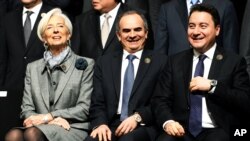Turkey's president has spooked markets by criticizing his central bank chief for failing to reduce interest rates. With inflation remaining high, the bank chief has ignored the president's calls. As elections loom and unemployment rises with a slowing economy, the president appears determined to have his way.
President Recep Tayyip Erdogan 'spublic reprimand of central bank chief Erdem Basci for failing to cut interest rates has caused the Turkish lira to hit record lows against the dollar and the Turkish stock market to fall.
Despite such turmoil the president continues to criticize Basci. Chief economist of the Istanbul-based Finans Bank, Inan Demir, says the president’s comments are counterproductive.
"These comments have been coming in the context of questioning central bank’s independence. I think the markets will have a hard time in dismissing these altogether. And further intervention in that way are bound to undermine central bank creditability further, increasing the premium that Turkey will need to pay just to keep Turkish lira stable. Clearly the level [of] interest rates right now is not enough to stabilize the Turkish lira," said Demir.
Central bank chief Basci refuses to cut the rates because inflation remains above the bank’s target. Erdogan has raised eyebrows by challenging economic orthodox thinking, saying lower rates would cut inflation.
In June, the president’s ruling AK Party faces a general election amid a sluggish economy and rising unemployment. Analyst Atilla Yesilada of Global Source Partners says election politics could be behind the president’s attacks on Basci.
"First, he wants to blame the poor shape of the economy on Erdem Basci. Two, he wants to keep his immense pressure, volcanic pressure on Erdem Basci to launch a series of interest rate cuts to force central bank to go beyond reason, to give a sort of doping shot to the arm of the economy," said Yesilada.
While opinion polls indicate the AK Party has a commanding lead, Erdogan is seeking a two-thirds parliamentary majority to introduce constitutional reform aimed at turning the country into a presidential system. Questions remain as to how long the central bank chief can remain in his position if Erdogan maintains his pressure.
Economist Demir warns if Basci does leave, the markets' reaction could be severe.
"We would see a short-term negative impact and also a de-rating of Turkish lira denominated assets from a long term perspective, it might well be significant. A lot would depend on how the global backdrop is evolving at that point of time if this happens; but if it comes at a particular disadvantageous time, I think the market impact would be very negative," he said.
The central bank was made legally independent after the country’s worst economic crisis in 2001. Analysts point out the threat to that independence comes amid growing concern about when the U.S. Federal Reserve will increase its interest rates.
Such a move is expected to have a negative effect on emerging markets like Turkey, which have boomed in an environment of nearly zero interest free money.
With the lira continuing to test record lows, consultant Yesilada warns if the battle of wills between Erdogan and his central bank chief continues the situation will worsen.
"Imagine election coming up, Turkish central bank mindlessly cutting interest rates and potentially coming under thumb of Mr. Erdogan and Fed raising interest rates, this is lethal combination. If Turkish lira is going to remain weak, I can tell you it is going to get very nasty. We are going to see defaults in the Turkish corporate bond market ; we are going to see a lot of companies falling into distress," he said.
Turkish companies and banks have borrowed heavily abroad in dollar-denominated loans, many of which are due to be repaid in the coming months. With the June general election expected to be fought in a highly polarized political atmosphere, analysts are predicting that will add to the nervousness of financial markets.




